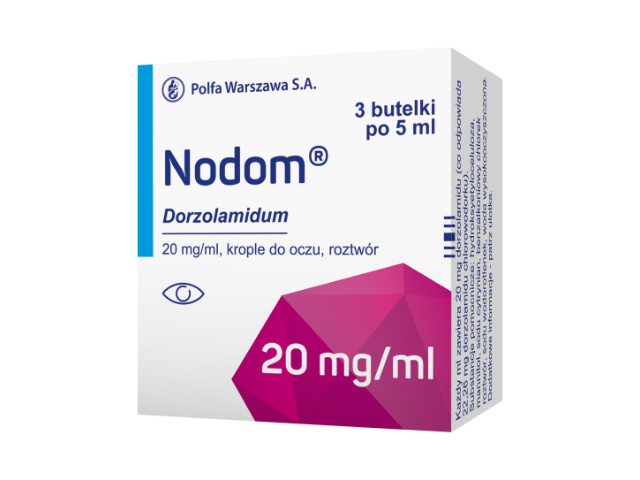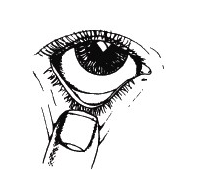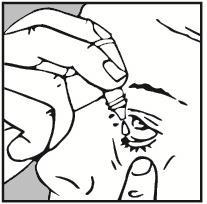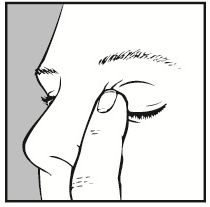

Nodom

Ask a doctor about a prescription for Nodom

How to use Nodom
Patient Information Leaflet: User Information
NODOM, 20 mg/ml, eye drops, solution
Dorzolamide
Read the leaflet carefully before using the medicine, as it contains important information for the patient.
- -Keep this leaflet, you may need to read it again.
- In case of any doubts, consult a doctor or pharmacist.
- This medicine has been prescribed specifically for you. Do not pass it on to others. The medicine may harm another person, even if their symptoms are the same.
- If the patient experiences any side effects, including any side effects not listed in this leaflet, they should tell their doctor or pharmacist. See section 4.
Table of Contents of the Leaflet
- 1. What is Nodom and what is it used for
- 2. Important information before using Nodom
- 3. How to use Nodom
- 4. Possible side effects
- 5. How to store Nodom
- 6. Contents of the pack and other information
1. What is Nodom and what is it used for
Nodom contains dorzolamide, which belongs to a group of medicines called "carbonic anhydrase inhibitors".
This medicine is recommended to reduce increased pressure in the eye and to treat glaucoma.
It can be used as the only eye medicine or together with other medicines that lower pressure in the eyes (called beta-adrenergic blocking agents).
2. Important information before using Nodom
When not to use Nodom:
- if the patient is allergic to dorzolamide hydrochloride or any of the other ingredients of this medicine (listed in section 6);
- if the patient has severe kidney problems or kidney disease, or has had kidney stones in the past.
Warnings and precautions
Before starting to use Nodom, discuss it with a doctor or pharmacist.
Tell the doctor or pharmacist about all current or past health problems, including eye diseases or eye surgery, as well as allergies to any medicines.
Consult a doctor immediately if, during the use of the medicine, eye irritation occurs or any new eye problems appear, such as redness of the eye or swelling of the eyelids.
Stop using the medicine and consult a doctor immediately if the patient suspects that Nodom has caused an allergic reaction (e.g., skin rash, severe skin reaction, or itching).
Children
The effect of dorzolamide has been studied in infants and children under 6 years of age with increased pressure in the eye or eyes, or diagnosed with glaucoma. For more information, talk to a doctor.
Elderly
Studies have shown similar effects of dorzolamide in the elderly and younger patients.
Use in patients with liver function disorders
Tell the doctor about all liver problems that the patient has now or has had in the past.
Nodom and other medicines
Tell the doctor or pharmacist about all medicines (including eye drops) that the patient is using or plans to use. This is especially important if the patient is taking other carbonic anhydrase inhibitors, such as acetazolamide, or sulfonamides.
Pregnancy, breastfeeding, and fertility
If the patient is pregnant or breastfeeding, thinks she may be pregnant, or plans to have a child, she should consult a doctor or pharmacist before using this medicine.
Use during pregnancy
Do not use this medicine during pregnancy.
Tell the doctor if the patient is pregnant or plans to become pregnant.
Use during breastfeeding
If treatment with this medicine is necessary, breastfeeding should be stopped.
Tell the doctor if the patient is breastfeeding or plans to breastfeed.
Effect on fertility
Data from animal studies do not indicate that dorzolamide treatment affects fertility in males and females. There are no data available for humans.
Driving and using machines
No studies have been conducted on the effect of dorzolamide on the ability to drive or operate machinery.
Side effects of Nodom, such as dizziness and vision disturbances, may affect the ability to drive or operate machinery. Do not drive or operate machinery until you feel better or the vision disturbance has resolved.
Nodom contains benzalkonium chloride
The medicine contains 0.075 mg of benzalkonium chloride in 1 ml of solution.
Benzalkonium chloride may be absorbed by soft contact lenses and change their color. Remove contact lenses before instilling and wait at least 15 minutes before putting them back.
Benzalkonium chloride can also cause eye irritation, especially in people with dry eye syndrome or corneal disorders (the transparent layer at the front of the eye). If abnormal sensations in the eye, stinging, or eye pain occur after using the medicine, consult a doctor.
3. How to use Nodom
Always use this medicine exactly as your doctor has told you. If you are not sure, ask your doctor or pharmacist.
The correct dosage and duration of treatment will be determined by your doctor.
If this medicine is used alone, the recommended dose is one drop into the affected eye(s) in the morning, afternoon, and evening.
If the doctor has prescribed this medicine with a beta-adrenergic blocking agent in the form of eye drops that lower pressure in the eye(s), the dose is one drop of Nodom into the affected eye(s) in the morning and evening.
If the patient is using other eye medicines at the same time as Nodom, wait at least 10 minutes between instilling the different medicines. Apply eye ointments last.
Avoid touching the tip of the dropper bottle to the eye or its surroundings. The dropper may become contaminated with bacteria, which can cause eye infections, leading to serious eye damage and vision loss. To avoid contaminating the medicine, protect the tip of the dropper from contact with any surface.
Instructions for use
- 1. Wash your hands thoroughly before instilling the medicine.
- 2. Remove the cap from the bottle.
- 3. After removing the cap, if the tamper-evident ring is loose, remove it before using the medicine, as it may fall into the eye and cause injury.
- 4. Tilt your head back and gently pull the lower eyelid down to create a pocket between the eyelid and the eye.

- 5. Turn the bottle upside down and gently press the thumb or index finger on the wall until one drop of medicine falls into the eye. DO NOT TOUCH THE TIP OF THE DROPPER TO THE EYE OR EYELID. If the drop does not fall into the eye, instill another one.

- 6. Close the eye and press the inner corner of the eye with your finger for about two minutes. This helps prevent the medicine from entering the entire body.

- 7. Repeat steps 4-6 if the doctor has prescribed instillation of the medicine into the second eye.
- 8. The dropper is designed to measure the drops accurately, so DO NOT enlarge the opening of the dropper.
- 9. After instillation, screw the bottle cap back on. However, do not tighten it too much.
Using more Nodom than prescribed
In case of instilling too many drops into the eye or swallowing the contents of the bottle, consult a doctor immediately.
Missing a dose of Nodom
It is important to use this medicine as prescribed by the doctor.
If a dose is missed, instill the medicine as soon as possible.
However, if it is almost time for the next dose, skip the missed dose and return to the normal dosing schedule.
Do not use a double dose to make up for the missed dose.
Stopping the use of Nodom
If the patient wants to stop using the medicine, consult a doctor immediately.
In case of any further doubts about the use of this medicine, consult a doctor or pharmacist.
4. Possible side effects
Like all medicines, this medicine can cause side effects, although not everybody gets them.
If the patient experiences allergic reactions, including hives, face, lip, tongue, and/or throat swelling, which may cause difficulty breathing or swallowing, stop using the medicine and seek medical advice immediately.
During clinical trials with dorzolamide or after its introduction to the market, the following side effects were reported:
Very common side effects(more than 1 in 10 people)
Burning and stinging of the eyes.
Common side effects(between 1 in 10 and 1 in 100 people)
Corneal disorders with eye pain and blurred vision (superficial punctate keratitis), tearing, discharge with itching of the eyes (conjunctivitis), irritation/inflammation of the eyelids, blurred vision, headache, nausea, bitter taste in the mouth, fatigue.
Uncommon side effects(between 1 in 100 and 1 in 1,000 people)
Iritis.
Rare side effects(between 1 in 1,000 and 1 in 10,000 people)
Numbness and/or tingling of hands and/or feet, transient myopia resolving after treatment discontinuation, fluid accumulation under the retina (choroidal detachment after filtration surgery), eye pain, eyelid sticking, low eye pressure, corneal edema (with symptoms of vision disturbance), eye irritation with redness, kidney stones, dizziness, nosebleeds, throat irritation, dry mouth, local rash (contact dermatitis), severe skin reactions, allergic reactions such as hives, rash, itching. In rare cases, possible swelling of the lips, eyes, and mouth, shortness of breath, and less frequently wheezing.
Frequency not known(frequency cannot be estimated from the available data)
Shortness of breath.
Feeling of a foreign body in the eye (feeling that something is in the eye).
Strong heartbeat, which can be fast or irregular (palpitations).
Increased heart rate.
Increased blood pressure.
Reporting side effects
If any side effects occur, including any side effects not listed in this leaflet, tell a doctor or pharmacist. Side effects can be reported directly to the Department of Drug Safety Monitoring of the Office for Registration of Medicinal Products, Medical Devices, and Biocidal Products
Jerozolimskie Avenue 181C
02-222 Warsaw
Phone: +48 22 49 21 301
Fax: +48 22 49 21 309
Website: https://smz.ezdrowie.gov.pl
Side effects can also be reported to the marketing authorization holder.
Reporting side effects will help to gather more information on the safety of this medicine.
5. How to store Nodom
Keep the medicine out of the sight and reach of children.
Store in a temperature below 25°C.
Do not use this medicine after the expiry date stated on the carton and bottle after: EXP. The expiry date stated is the last day of the month.
The inscription on the packaging after the abbreviation EXP means the expiry date, and after the abbreviation Lot means the batch number.
After opening the bottle, do not use the medicine for more than 28 days. After this time, the medicine should be discarded, even if it has not been used up.
Medicines should not be disposed of via wastewater or household waste. Ask a pharmacist how to dispose of medicines that are no longer needed. This will help protect the environment.
6. Contents of the pack and other information
What Nodom contains
- The active substance is dorzolamide. Each ml contains 20 mg of dorzolamide (equivalent to 22.26 mg of dorzolamide hydrochloride). Each bottle contains 5 ml (not less than 140 drops).
- The other ingredients are: hydroxyethylcellulose, mannitol, sodium citrate, benzalkonium chloride solution, sodium hydroxide, water for injections.
What Nodom looks like and contents of the pack
Nodom is a sterile eye drop solution, colorless, clear, slightly viscous.
The medicine is available in polyethylene bottles containing 5 ml of solution, with a dropper and cap.
Packaging:
1 bottle of 5 ml, in a cardboard box
3 bottles of 5 ml, in a cardboard box.
Not all pack sizes may be marketed.
Marketing authorization holder
Zakłady Farmaceutyczne POLPHARMA S.A.
Pelplińska 19, 83-200 Starogard Gdański
phone: +48 22 364 61 01
Manufacturer
Rafarm S.A.
Thesi Pousi Xatzi Agiou Louka
Paiania, 190 02
Greece
Date of last revision of the leaflet:
- Country of registration
- Active substance
- Prescription requiredYes
- Manufacturer
- ImporterRafarm S.A.
- This information is for reference only and does not constitute medical advice. Always consult a licensed doctor before taking any medication. Oladoctor is not responsible for medical decisions based on this content.
- Alternatives to NodomDosage form: Drops, 20 mg/mlActive substance: dorzolamideManufacturer: Bruschettini S.r.I.Prescription requiredDosage form: Drops, 20 mg/mlActive substance: dorzolamidePrescription requiredDosage form: Drops, 20 mg/mlActive substance: dorzolamideManufacturer: S.C. Rompharm Company S.R.L.Prescription required
Alternatives to Nodom in other countries
The best alternatives with the same active ingredient and therapeutic effect.
Alternative to Nodom in Spain
Alternative to Nodom in Ukraine
Online doctors for Nodom
Discuss dosage, side effects, interactions, contraindications, and prescription renewal for Nodom – subject to medical assessment and local rules.














